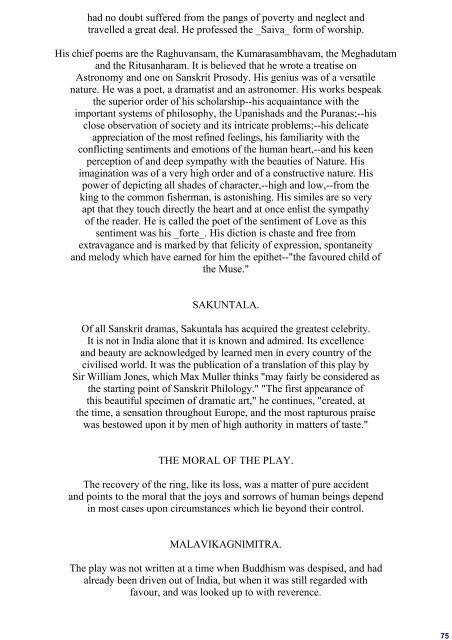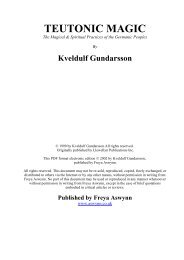TALES FROM THE HINDU DRAMATISTS - Awaken Video
TALES FROM THE HINDU DRAMATISTS - Awaken Video
TALES FROM THE HINDU DRAMATISTS - Awaken Video
Create successful ePaper yourself
Turn your PDF publications into a flip-book with our unique Google optimized e-Paper software.
had no doubt suffered from the pangs of poverty and neglect and<br />
travelled a great deal. He professed the _Saiva_ form of worship.<br />
His chief poems are the Raghuvansam, the Kumarasambhavam, the Meghadutam<br />
and the Ritusanharam. It is believed that he wrote a treatise on<br />
Astronomy and one on Sanskrit Prosody. His genius was of a versatile<br />
nature. He was a poet, a dramatist and an astronomer. His works bespeak<br />
the superior order of his scholarship--his acquaintance with the<br />
important systems of philosophy, the Upanishads and the Puranas;--his<br />
close observation of society and its intricate problems;--his delicate<br />
appreciation of the most refined feelings, his familiarity with the<br />
conflicting sentiments and emotions of the human heart,--and his keen<br />
perception of and deep sympathy with the beauties of Nature. His<br />
imagination was of a very high order and of a constructive nature. His<br />
power of depicting all shades of character,--high and low,--from the<br />
king to the common fisherman, is astonishing. His similes are so very<br />
apt that they touch directly the heart and at once enlist the sympathy<br />
of the reader. He is called the poet of the sentiment of Love as this<br />
sentiment was his _forte_. His diction is chaste and free from<br />
extravagance and is marked by that felicity of expression, spontaneity<br />
and melody which have earned for him the epithet--"the favoured child of<br />
the Muse."<br />
SAKUNTALA.<br />
Of all Sanskrit dramas, Sakuntala has acquired the greatest celebrity.<br />
It is not in India alone that it is known and admired. Its excellence<br />
and beauty are acknowledged by learned men in every country of the<br />
civilised world. It was the publication of a translation of this play by<br />
Sir William Jones, which Max Muller thinks "may fairly be considered as<br />
the starting point of Sanskrit Philology." "The first appearance of<br />
this beautiful specimen of dramatic art," he continues, "created, at<br />
the time, a sensation throughout Europe, and the most rapturous praise<br />
was bestowed upon it by men of high authority in matters of taste."<br />
<strong>THE</strong> MORAL OF <strong>THE</strong> PLAY.<br />
The recovery of the ring, like its loss, was a matter of pure accident<br />
and points to the moral that the joys and sorrows of human beings depend<br />
in most cases upon circumstances which lie beyond their control.<br />
MALAVIKAGNIMITRA.<br />
The play was not written at a time when Buddhism was despised, and had<br />
already been driven out of India, but when it was still regarded with<br />
favour, and was looked up to with reverence.<br />
75
















